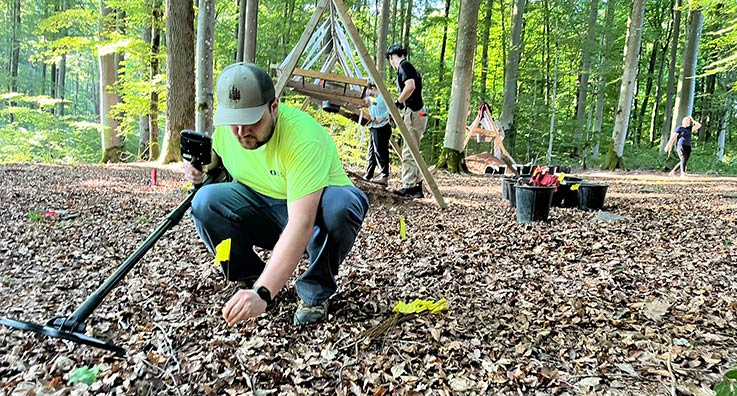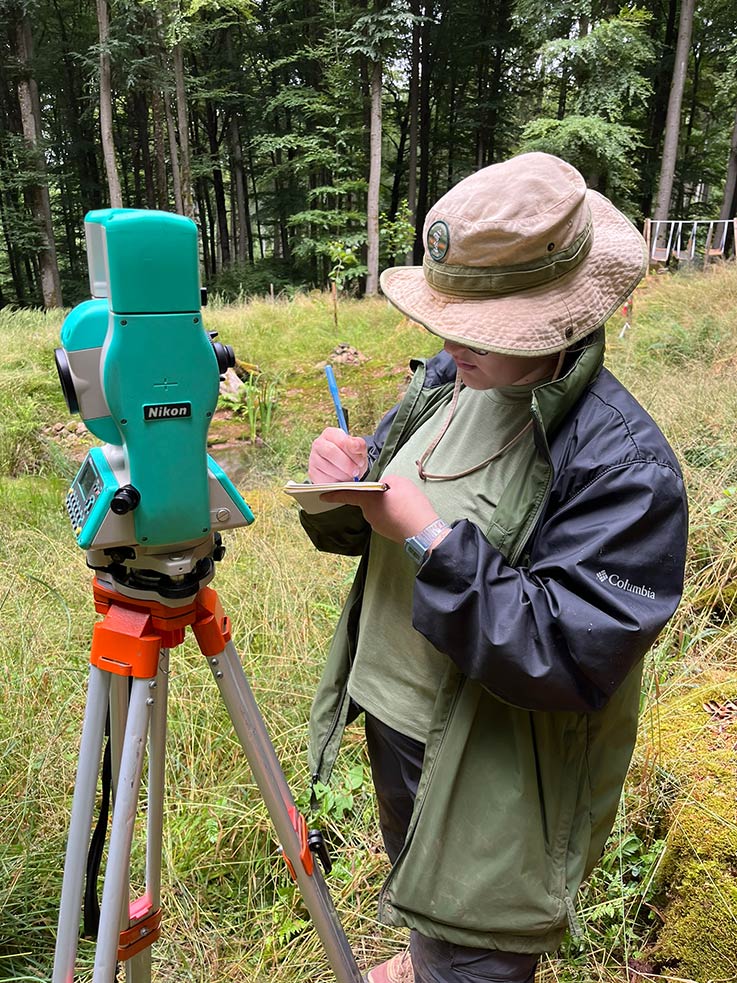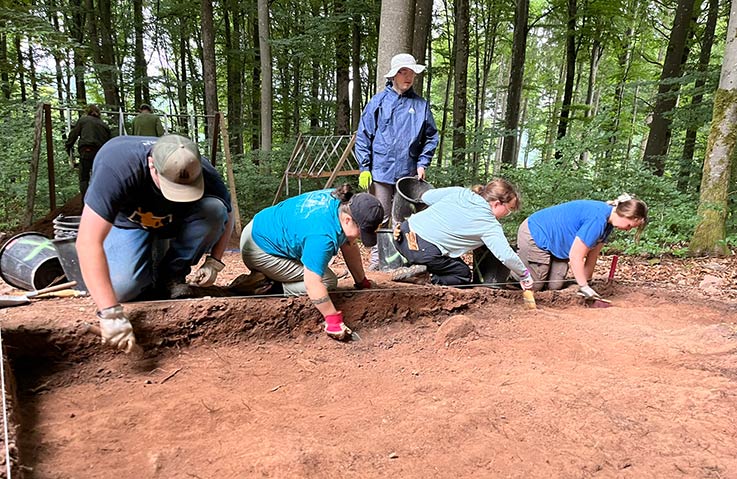On July 11, the Department of Defense POW/MIA Accounting Agency distributed a news release about the identification of a World War II soldier who died in December 1944, crediting the work of an Indiana University of Pennsylvania field school in assisting in identifying the late soldier’s remains.
For the past five years, IUP has been selected by the Department of Defense POW/MIA Accounting Agency through the Henry M. Jackson Foundation for the Advancement of Military Medicine Inc. to continue its field study in Germany at the site of a December 1944 crash of a World War II B-17 airplane. The project is directed by anthropology faculty members Andrea Palmiotto and William Chadwick in IUP’s Department of Anthropology, Geospatial and Earth Sciences; the 2025 field school takes place from June 15 to July 26.

IUP student Oliver Casadei conducting metal detection.
In summer 2021, Palmiotto and Chadwick led IUP students at a field school near Gifhorn, Germany, at the site of a World War II B-24 plane crash. They began work at the crash site in Baden-Württemberg, Germany, where this year’s field study is taking place, in 2022 and returned to the site in summer 2023 and 2024.
“We promise our students real-life experiences and faculty members who are leaders in their profession,” IUP Dean of the John J. and Char Kopchick College of Natural Sciences and Mathematics Steve Hovan said. “Projects like this, for which students earn academic credit, reflect these promises kept to our students and provide an opportunity for our students to literally change the lives of this fallen soldier’s family and friends with their studies. I am extremely proud of Dr. Palmiotto and Dr. Chadwick for their leadership and of the entire IUP team for its work.”
“It is truly an honor to involve students in this investigation, where they gain hands-on experience in working with a national agency and how what they’ve learned in the classroom about the practice of anthropology applies in a real-life investigation,” Palmiotto said. “It’s very rewarding and humbling to be part of this discovery and to help the Department of Defense POW/MIA Accounting Agency provide answers to the late Lt. Leverett’s family and friends.”
The news release from Defense POW/MIA Accounting Agency follows:
This article originally appeared at Defense POW/MIA Accounting Agency on July 11, 2025. Reprinted with permission.
WASHINGTON – The Defense POW/MIA Accounting Agency announced today that U.S. Army Air Force 1st Lt. Wylie W. Leverett, 28, of Wortham, Texas, killed during World War II, was accounted for Aug. 21, 2024.

IUP Applied Archaeology MA student Ella Sibilia recording spatial data with a total station.
Leverett’s family recently received their full briefing on his identification, therefore, additional details on his identification can be shared.
In late 1944, Leverett was assigned to the 708th Bombardment Squadron, 447th Bombardment Group, 4th Combat Bomb Wing, 3rd Air Division, 8th Air Force, in the European Theater. On Dec. 30, Leverett, the pilot onboard a B-17G “Flying Fortress” Fuddy Duddy, was lost when his aircraft collided with another American aircraft while on a bombing mission to Mannheim, Germany. As the formation of bombers neared their attack location, a bomber in the low position of the lead squadron suddenly lost altitude. At the same time, Fuddy Duddy rose in altitude. It’s not known why these two aircraft unexpectedly changed their altitude simultaneously, but witnesses suspected the prop-wash from the formation created turbulence around the bombers. Surviving aircrew reported seeing the first Flying Fortresses’ propellers slicing through Fuddy Duddy’s thin aluminum skin cutting the aircraft fuselage in two. Fuddy Duddy then rolled over and went into an uncontrolled spin downwards. The other aircraft, also badly damaged, careened downward, falling through the clouds.
Of the 18 personnel serving aboard the two aircraft, only two Fuddy Duddy crewmen survived the incident. In the immediate aftermath of the crash, local farmers from Mudau, Germany, found 13 of the remaining 16 crew members. The civilians brought the remains to the Catholic church at Steinbach where they were laid out and examined and eventually buried in a single mass grave.

Left to right: Oliver Casadei (IUP), Ella Sibilia (IUP), Evan Matney (Kenyon College), Francesca Fiorello (James Madison University), and Megan McCracken (IUP) excavating on site.
In Jan. 1946, the American Graves Registration Command (AGRC), the organization that searched for and recovered fallen American personnel in the European Theater, sent a team to Steinbach, Germany, to investigate. They interviewed witnesses to the crash, the residents who collected the remains of the crew, and the cemetery personnel. Eventually the remains were exhumed, examined, and brought to the U.S. Military Cemetery at St. Avold, France, where they were interred in February 1946.
In May 2019, DPAA contracted History Flight, Inc., to excavate the crash site believed to be that of Fuddy Duddy. The History Flight team described the site as “severely scavenged,” but was able to recover possible material evidence and osseous materials, which were transferred to the DPAA laboratory for analysis and identification. Between June and July 2022, through a cooperative agreement with DPAA partner the Indiana University of Pennsylvania, further investigation took place using ground-penetrating radar to scan and identify areas to excavate at the Fuddy Duddy crash site. The IUP team also recovered items which were transferred to the DPAA lab. Finally, in June 2023, the IUP team returned to the site, where they recovered an identification tag belonging to one of the missing aircrew, which confirmed the site as Fuddy Duddy’s final resting place.
IUP anthropologists and students helped investigate the crash site. Read more about their fieldwork in Germany.
To identify Leverett’s remains, scientists from DPAA used anthropological and circumstantial analysis. Additionally, scientists from the Armed Forces Medical Examiner System used mitochondrial and Y-chromosome DNA analysis.
Leverett’s name is recorded on the Tablets of the Missing at Lorraine American Cemetery, St. Avold, France, along with others still missing from WWII. A rosette will be placed next to his name to indicate he has been accounted for.
Leverett will be buried in Dallas, Texas, in 2025.
For family and funeral information, contact the Army Casualty Office at (800) 892-2490.
DPAA is grateful to History Flight Inc, and the Indiana University of Pennsylvania for their partnerships and support. DPAA would also like to thank the American Battle Monuments Commission and to the U.S. Army Regional Mortuary-Europe for their partnership in this mission.
For additional information on the Defense Department’s mission to account for Americans who went missing while serving our country, visit the DPAA website at www.dpaa.mil or find us on social media at www.facebook.com/dodpaa or www.linkedin.com/company/defense-pow-mia-accounting-agency.